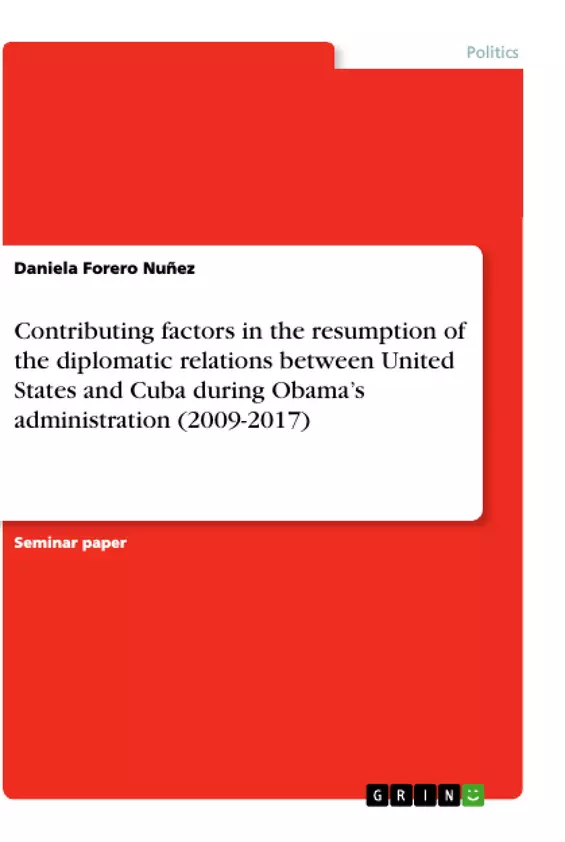This paper attempts to analyze which factors played a significant role in the resumption of the diplomatic relations between the United States and Cuba during Obama's administration (2009-2017). The diplomatic relations between the United States and Cuba have been deeply shaped by several political and especially ideological tensions since the 20th century. The US foreign policy to-wards Cuba in the last decades has been characterized by hard-power measures such as sanctions and restrictions. However, a milestone in the history of the continent has been placed by Obama's government, which achieved a historical rapprochement with the Cuban government of Castro. Both US and Cuba don't know the ultimate outcome of the normalization process that started during the Obama's administration; nevertheless, they expect to move even more toward a friendly relationship despite the changes in the Cuba-foreign policy in the current times.
In order to determine which aspects were crucial for the attainment of this historical event, the most important arguments from the commercial liberalism and the constructivist theory should be examined. On one side it should be analyzed whether some of the structural changes and economic developments brought with the end of the Fidel Castro era had a significant impact on the shift in the U.S foreign policy toward Cuba and favored the resumption of the diplomatic relations with Cuba. On the other hand, it should be discussed which disparities and similarities in the national identities, and values of both countries, which root in very diverse historical events; may have contributed to a political rapprochement.
Inhaltsverzeichnis (Table of Contents)
- Introduction
- Resumption of the diplomatic relations between the USA and Cuba
- Relationship and diplomatic relations USA-Cuba between 1989 and 2009
- Political rapprochement of Obama's government (2009-2017)
- Theories (Hypothesis development)
- Liberalism
- Constructivism
- Analysis (Hypothesis testing)
- Liberalism
- Role of soft power in the enhancement of cooperation and multilateralism
- Commercial liberalism - economic opening and democracy promotion
- Impact of economic cooperation and international organizations in the regional integration
- Constructivism
- Role of national identity and political ideology in international cooperation
- Incompatibility of values, principles and norms as obstacle for the strengthening of civil society and the respect of human rights
- Liberalism
- Conclusion
Zielsetzung und Themenschwerpunkte (Objectives and Key Themes)
This paper aims to analyze the contributing factors in the resumption of diplomatic relations between the United States and Cuba during Obama's administration (2009-2017). It seeks to determine which aspects, primarily from the perspectives of commercial liberalism and constructivism, were crucial for achieving this historical event.
- The role of structural changes and economic developments after the Fidel Castro era in influencing U.S. foreign policy toward Cuba.
- The impact of national identity and political ideology disparities and similarities between the two countries on the political rapprochement.
- The significance of soft power, economic opening, democracy promotion, and international organizations in the process of diplomatic normalization.
- The importance of civil society, human rights, and the potential for a democratic transition in Cuba.
- The comparative analysis of commercial liberalism and constructivism in explaining the resumption of diplomatic relations between the United States and Cuba.
Zusammenfassung der Kapitel (Chapter Summaries)
- Introduction: Provides an overview of the complex historical relationship between the United States and Cuba, characterized by ideological tensions and U.S. foreign policy measures, including sanctions and restrictions. Introduces the objective of the paper, focusing on the factors influencing the resumption of diplomatic relations during Obama's administration. Highlights the significance of commercial liberalism and constructivist theories in analyzing this event.
- Resumption of diplomatic relations between the USA and Cuba: Presents a historical overview of the relationship between the two countries between 1989 and 2009, emphasizing the Cuban Democracy Act, the Cuban Liberty and Democratic Solidarity Act, and the impact of the Soviet Union's collapse. Explains the shift in Cuban foreign policy under Raúl Castro's leadership and the importance of economic openness for a democratic transition.
- Political rapprochement of Obama's government (2009-2017): Examines Obama's approach to foreign policy toward Cuba, emphasizing the strategic significance of the island in the region. Explores the principles of involvement, multilateralism, cooperation, and the use of "soft power" that characterized Obama's foreign policy toward Cuba. Highlights the importance of "public democracy" as an instrument of soft power.
Schlüsselwörter (Keywords)
This study focuses on the resumption of diplomatic relations between the United States and Cuba, examining the interplay of commercial liberalism and constructivism. Key concepts include foreign policy, soft power, economic openness, democracy promotion, civil society, human rights, national identity, political ideology, and international organizations.
- Quote paper
- Daniela Forero Nuñez (Author), 2019, Contributing factors in the resumption of the diplomatic relations between United States and Cuba during Obama’s administration (2009-2017), Munich, GRIN Verlag, https://www.grin.com/document/1035669



